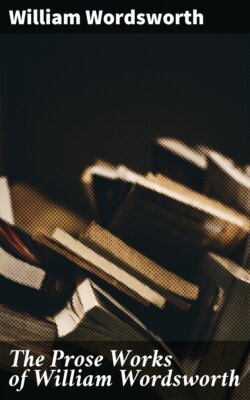Читать книгу The Prose Works of William Wordsworth - William Wordsworth - Страница 41
На сайте Литреса книга снята с продажи.
Оглавление—The reader will excuse this long note; to which however I must add one word:—Is it not strange that, in the general decision of the Board, zeal and firmness—nakedly considered, and without question of their union with judgment and such other qualities as can alone give them any value—should be assumed as sufficient grounds on which to rest the acquittal of men lying under a charge of military delinquency?
B (page 72).
It is not necessary to add, that one of these fears was removed by the actual landing of ten thousand men, under Sir J. Moore, pending the negotiation: and yet no change in the terms took place in consequence. This was an important circumstance; and, of itself, determined two of the members of the Board of Inquiry to disapprove of the convention: such an accession entitling Sir H. Dalrymple (and, of course, making it his duty) to insist on more favourable terms. But the argument is complete without it.
C (page 75).
I was unwilling to interrupt the reader upon a slight occasion; but I cannot refrain from adding here a word or two by way of comment.—I have said at page 71, speaking of Junot's army, that the British were to encounter the same men, &c. Sir Arthur Wellesley, before the Board of Inquiry, disallowed this supposition; affirming that Junot's army had not then reached Spain, nor could be there for some time. Grant this: was it not stipulated that a messenger should be sent off, immediately after the conclusion of the treaty, to Buonaparte—apprising him of its terms, and when he might expect his troops; and would not this enable him to hurry forward forces to the Spanish frontiers, and to bring them into action—knowing that these troops of Junot's would be ready to support him? What did it matter whether the British were again to measure swords with these identical men; whether these men were even to appear again upon Spanish ground? It was enough, that, if these did not, others would—who could not have been brought to that service, but that these had been released and were doing elsewhere some other service for their master; enough that every thing was provided by the British to land them as near the Spanish frontier (and as speedily) as they could desire.
D (page 108).
This attempt, the reader will recollect, is not new to our country;—it was accomplished, at one aera of our history, in that memorable act of an English Parliament, which made it unlawful for any man to ask his neighbour to join him in a petition for redress of grievances: and which thus denied the people 'the benefit of tears and prayers to their own infamous deputies!' For the deplorable state of England and Scotland at that time—see the annals of Charles the Second, and his successor.—We must not forget however that to this state of things, as the cause of those measures which the nation afterwards resorted to, we are originally indebted for the blessing of the Bill of Rights.
E (page 159).
I allude here more especially to an address presented to Buonaparte (October 27th, 1808) by the deputies of the new departments of the kingdom of Italy; from which address, as given in the English journals, the following passages are extracted:—
'In the necessity, in which you are to overthrow—to destroy—to disperse your enemies as the wind dissipates the dust, you are not an exterminating angel; but you are the being that extends his thoughts—that measures the face of the earth—to re-establish universal happiness upon better and surer bases.'
'We are the interpreters of a million of souls at the extremity of your kingdom of Italy.'—'Deign, Sovereign Master of all Things, to hear (as we doubt not you will)' &c.
The answer begins thus:—
'I applaud the sentiments you express in the name of my people of Musora, Metauro, and Tronto.'
F (page 163).
This principle, involved in so many of his actions, Buonaparte has of late explicitly avowed: the instances are numerous: it will be sufficient, in this place, to allege one—furnished by his answer to the address cited in the last note:—
'I am particularly attached to your Archbishop of Urbino: that prelate, animated with the true faith, repelled with indignation the advice—and braved the menaces—of those who wished to confound the affairs of Heaven, which never change, with the affairs of this world, which are modified according to circumstances of force and policy.'
